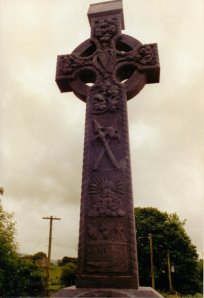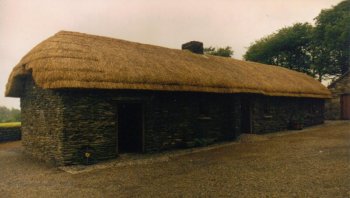At Boolavogue as the sun was setting
O’er the bright May meadows of Shelmalier,
A rebel hand set the heather blazing
and brought the neighbours from far and near.
That’s the first verse of the song Boolavogue, which tells the story of the 1798 Irish rebellion in Counties Wexford and Wicklow, and of one of its leaders, Father John Murphy.
Nicholas Delaney, my great-great-great grandfather, was a landless peasant from Ballyellis – a small townland on the Wicklow/Wexford border – and worked near Carnew, scene of a notorious massacre.
Inevitably he became involved in the uprising as a United Irishman and was later accused of murdering four yeomen (from the government’s volunteer military units). Convicted of killing two of them, he was sentenced to death, but this was later commuted to transportation to Australia.
While my mother and I were writing Nicholas’s story, we wanted to give our book a title which had a ring to it. There are many songs about 1798 and we thought about several of our favourites, like The Boys of Wexford, The Croppy Boy and The Rising of the Moon before choosing Boolavogue.
I’d loved the song long before I realised I had a connection with it. My friend Tom had the Dubliners’ version on an LP (yes, that long ago) and I’d insist on hearing it. Far too often, probably. And it mentions places Nicholas was in – Ballyellis, Camolin, Vinegar Hill, for instance.
So it wasn’t a hard decision in the end, especially since Nicholas was both a rebel and a labourer – a hired hand.
Boolavogue
At Boolavogue as the sun was setting
O’er the bright May meadows of Shelmalier,
A rebel hand set the heather blazing
and brought the neighbours from far and near.Then Father Murphy from old Kilcormack
Spurred up the rocks with a warning cry:
‘Arm! Arm!’ he cried, ‘For I’ve come to lead you;
For Ireland’s freedom we’ll fight or die!’He led us on against the coming soldiers,
And the cowardly yeomen we put to flight:
‘Twas at the Harrow the boys of Wexford
Showed Bookey’s regiment how men could fight.Look out for hirelings, King George of England;
Search every kingdom where breathes a slave,
For Father Murphy of County Wexford
Sweeps o’er the land like a mighty wave.We took Camolin and Enniscorthy
And Wexford storming drove out our foes
‘Twas at Slieve Coilte our pikes were reeking
With the crimson blood of the beaten Yeos.At Tubberneering and Ballyellis
Full many a Hessian lay in his gore,
Ah! Father Murphy, had aid come over
The green flag floated from shore to shore!At Vinegar Hill, o’er the pleasant Slaney
Our heroes vainly stood back to back,
and the Yeos at Tullow took Father Murphy
and burned his body upon a rack.God grant you glory, brave Father Murphy
And open Heaven to all your men,
The cause that called you may call tomorrow
In another fight for the Green again.
I’ll post more about Boolavogue in a separate post (under this) if you’re interested, but briefly: it was written by Patrick Joseph McCall to commemorate the centenary of the rising in 1898 and set to the old Irish air Youghal Harbour. The lyrics here are from Wikipedia.
PS: to the person who lifted my photograph of the Ballyellis cross today, 12th February 2012, and re-used it without crediting this site, you can’t get away with doing that in secret these days. I won’t give you a link, either. But I know what you’ve done!
If you’d asked to use it, I probably would have said yes. Oh, well…









Pingback: The Bloggers’ Geneameme – my answers | A Rebel Hand: Nicholas Delaney of 1798
Pingback: Requiem for Seamus Heaney | A Rebel Hand: Nicholas Delaney of 1798
Pingback: Vinegar Hill – the Irish rebels’ last stand | A Rebel Hand: Nicholas Delaney of 1798
Of course, Boulavogue is not in Shelmalier, but in Scarawalsh, I believe, Ah well, poetic licence. McCall is responsible for much of the mythology around 1798.
LikeLike
Poetic licence, indeed.
LikeLike
Pingback: Some happy finds | A Rebel Hand
One of the great things about the Challenge is I learn something new about history in the stories behind the songs and poems. I didn’t know about the 1798 Rebellion until I read your post, and then I had to hear the song performed so I found the Dubliners’ version on Youtube!
Thanks for taking part in the Challenge!
LikeLike
Thanks for setting the Challenge!
It’s great to be inspired by fellow genealogy bloggers. I really enjoyed it – and spent far too long on YouTube choosing versions of Boolavogue. Looking forward to next year…
LikeLike
DIdn’t say I love your images in the header.
LikeLike
Thank you! I spent many enjoyable hours going through old family pictures, photos from research trips and I saw the ship off the coast of Cornwall, near Daphne Du Maurier’s house – a lucky accident.
LikeLike
I’ve never heard this song so I’m pleased to read it here -with Irish ancestry it speaks to me also.
LikeLike
I think anyone living in Ireland at the time of the 1798 Rebellion was affected by it, even if they weren’t involved directly in the conflict, because the backlash was so harsh. But for decades it was as if it couldn’t be mentioned, as far as songs and poetry are concerned, with a few exceptions that I’m aware of.
LikeLike